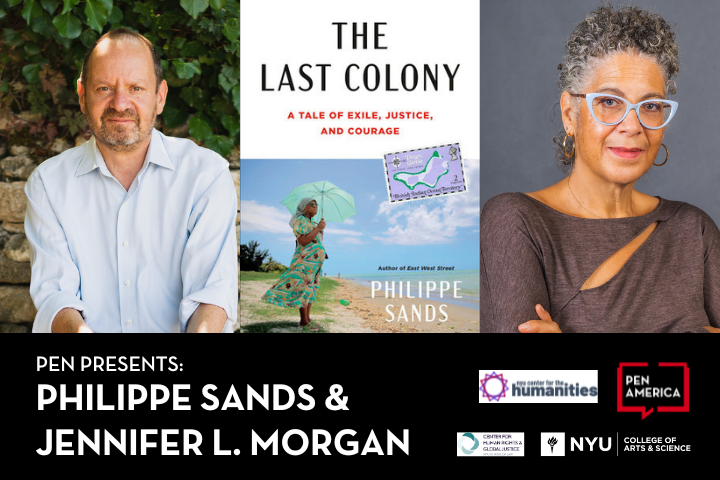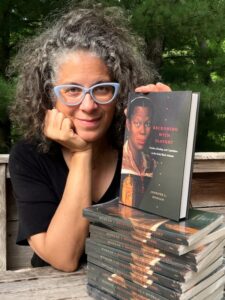Philippe Sands & Jennifer L. Morgan | PEN Presents

Philippe Sands joins PEN America and NYU’s Arthur L. Carter Journalism Institute and NYU Center for the Humanities to discuss his new novel The Last Colony with Professor of History Jennifer L. Morgan.
Copies of The Last Colony will be sold by McNally Jackson. Can’t make the event? Order a copy from them HERE.
This in-person event at NYU’s Arthur L. Carter Journalism Institute will start at 3:30 pm ET with a reception on November 10. Food and drinks will be provided. Masks are encouraged.
About the Book
The moving, inspiring David-and-Goliath true story of freedom and justice involving one tiny nation in the Indian Ocean off the coast of Africa, and the extraordinary woman, a descendant of slaves, who dared to take on the Crown and the United Kingdom—and win a historic victory.
In 1973, on the Chagos Islands off the coast of Africa, Liseby Elyse—twenty years old, newly married and four months pregnant—was, rounded up, along with the entire population of Chagos, and ordered to pack her belongings and leave her beloved homeland by ship or slowly starve; the British had cut off all food supplies.
Some two thousand people who had lived on the islands of Chagos for generations, many the direct descendants of enslaved people brought there from Mozambique and Madagascar in the 18th century by the French and British, were deported overnight from their island paradise as the result of a secret decision by the British government to provide the United States with land to construct a military base in the Indian Ocean.
For four decades the government of Mauritius fought for the return of Chagos. Three decades into the battle, Philippe Sands became the lead lawyer in the case, designing its legal strategy and assembling a team of lawyers from Mauritius, Belgium, India, Ukraine, and the U.S.
When the case finally reached the World Court in the Hague, Sands chose as the star witness the diminutive Liseby Elyse, now sixty-five years old, and instructed her to appear before the court, speaking in Kreol, to tell the fourteen international judges her story of forced exile. The fate of Chagos rested on her testimony. The judges faced a landmark decision: Would they rule that Britain illegally detached Chagos from Mauritius? Would Liseby Elyse sway the judges and open the door, allowing her and her fellow Chagossians to return home—or would they remain exiled forever?
Philippe Sands writes of his own journey into international law and that of the World Court in the Hague, and of the extraordinary decades-long quest of Liseby Elyse, and the people of Chagos, in their fight for justice and a free and fair return to the idyllic land of their birth.
Presented in Partnership with NYU’s Arthur L. Carter Journalism Institute and NYU Center for the Humanities.
Participants
 Philippe Sands is professor of law at the University of London, the Samuel Pisar Visiting professor at Harvard Law School, and the author of East West Street and The Ratline. He is a frequent commentator on CNN and the BBC World Service, and a litigator before international courts. He is the former president of English PEN. In 2003 Sands was appointed a Queen’s Counsel. He lives in London, England.
Philippe Sands is professor of law at the University of London, the Samuel Pisar Visiting professor at Harvard Law School, and the author of East West Street and The Ratline. He is a frequent commentator on CNN and the BBC World Service, and a litigator before international courts. He is the former president of English PEN. In 2003 Sands was appointed a Queen’s Counsel. He lives in London, England.
 Jennifer L. Morgan is Professor of History in the department of Social and Cultural Analysis at New York University. She is the author of the Reckoning with Slavery: Gender, Kinship and Capitalism in the Early Black Atlantic (Duke University Press, 2021) which won the Mary Nickliss Prize in Women’s and/or Gender History from the Organization of American Historians and the Frederick Douglass Prize awarded by the Gilder Lehrman Center for the Study of Slavery, Resistance, and Abolition; and of Laboring Women: Gender and Reproduction in the Making of New World Slavery (University of Pennsylvania Press, 2004). She is the the co-editor of Connexions: Histories of Race and Sex in America (University of Illinois Press, 2016). Her research examines the intersections of gender and race in in the early modern Black Atlantic. Her recent journal articles include “Partus Sequitur Ventrem: Law, Race, and Reproduction in Colonial Slavery,” in Small Axe; “Accounting for ‘The Most Excruciating Torment’: Trans-Atlantic Passages” in History of the Present and “Archives and Histories of Racial Capitalism” in Social Text. In addition to her archival work as an historian, Morgan has published a range of essays on race, gender, and the process of “doing history,” most notably “Experiencing Black Feminism” in Deborah Gray White’s edited volume Telling Histories: Black Women Historians in the Ivory Tower (2007). She is currently working on a study of slavery and the emergence of “private life” in the Early Modern English Atlantic world; and a project about slavery and freedom in the seventeenth century that centers around Elizabeth Key—the black woman who sued for her freedom in Virginia in 1656. Morgan serves as the Council Chair for the Omohundro Institute for Early American History and Culture. She is the past-Vice President of the Berkshire Conference of Women Historians and is a lifetime member of the Association of Black Women Historians. She lives in New York City.
Jennifer L. Morgan is Professor of History in the department of Social and Cultural Analysis at New York University. She is the author of the Reckoning with Slavery: Gender, Kinship and Capitalism in the Early Black Atlantic (Duke University Press, 2021) which won the Mary Nickliss Prize in Women’s and/or Gender History from the Organization of American Historians and the Frederick Douglass Prize awarded by the Gilder Lehrman Center for the Study of Slavery, Resistance, and Abolition; and of Laboring Women: Gender and Reproduction in the Making of New World Slavery (University of Pennsylvania Press, 2004). She is the the co-editor of Connexions: Histories of Race and Sex in America (University of Illinois Press, 2016). Her research examines the intersections of gender and race in in the early modern Black Atlantic. Her recent journal articles include “Partus Sequitur Ventrem: Law, Race, and Reproduction in Colonial Slavery,” in Small Axe; “Accounting for ‘The Most Excruciating Torment’: Trans-Atlantic Passages” in History of the Present and “Archives and Histories of Racial Capitalism” in Social Text. In addition to her archival work as an historian, Morgan has published a range of essays on race, gender, and the process of “doing history,” most notably “Experiencing Black Feminism” in Deborah Gray White’s edited volume Telling Histories: Black Women Historians in the Ivory Tower (2007). She is currently working on a study of slavery and the emergence of “private life” in the Early Modern English Atlantic world; and a project about slavery and freedom in the seventeenth century that centers around Elizabeth Key—the black woman who sued for her freedom in Virginia in 1656. Morgan serves as the Council Chair for the Omohundro Institute for Early American History and Culture. She is the past-Vice President of the Berkshire Conference of Women Historians and is a lifetime member of the Association of Black Women Historians. She lives in New York City.






